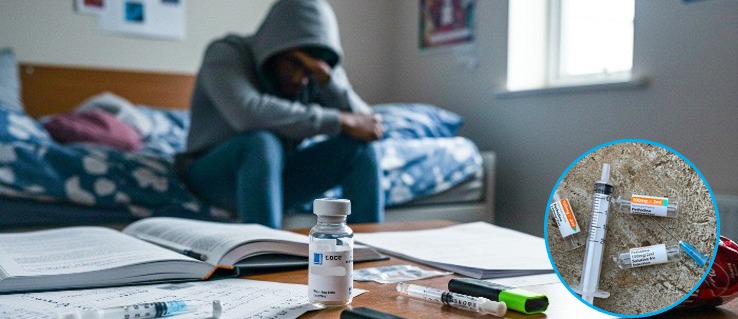In the third part of our series on “The Drug Problem”, we look at how students are abusing pethidine, a drug meant to relieve severe pain in patients, and its effects.
By Yasiri J. Kasango
In a small, dimly lit room near one of Uganda’s top universities, a conversation unfolds. Not the kind you would expect from students preparing for final exams—but a raw, unfiltered confession about addiction, secrets, and a deepening crisis no one seems ready to talk about.
What starts as a casual chat about a prescription painkiller, pethidine (often mispronounced as “petherdine”), quickly unravels into a sobering exposé: a world where powerful opioids and party drugs are not just weekend thrills—they are tools for coping, focus, and escape.
“You’d be surprised how many students are hooked,” one student says, pulling back the curtain on a hidden crisis. “They can’t pay rent, but they’re high every day.”
The narratives paint a grim portrait. Drugs once intended for emergency pain relief, like pethidine, morphine, and tramadol, are now being used recreationally and, paradoxically, for academic enhancement.
Originally developed to treat women in labour or patients in extreme trauma, pethidine is now reportedly being used by students to study longer, block out anxiety, or self-medicate through emotional stress.
But the side effects are chilling.
According to Healthdirect Australia, prolonged or unregulated use of pethidine can lead to severe dependence. It does not take much. “Pethidine rewires how your brain responds to pain and pleasure,” explains Dr Susan Nakyobe, a pharmacist based in Kampala. “Before you know it, the body starts to demand it—not for pain relief, but just to function.”
It’s not just about euphoria or a mental edge. Overdose is a looming risk. When taken in excess, pethidine can suppress breathing, lower heart rate, and trigger unconsciousness or worse. In some hospitals, emergency teams have recorded seizure cases directly linked to pethidine misuse. Unlike many opioids (drugs used to manage moderate to severe pain), pethidine metabolises into a toxic compound called normeperidine, which builds up in the body and poses lethal neurological risks, especially with repeated use or in people with kidney problems.
These drugs, as one might think, are not being trafficked through shady ghettos alone. Students speak of discreet campus dealers and rogue pharmacists who sell the drugs under the counter.
“These students buy pethidine from the drug shops and pharmacies,” one youth says. “But drugs don’t care about borders,” they add.
However, the Mukono District Health Office, Stephen Mulindwa, denies the allegation of easy access to pethidine. “Even I, as a doctor, can’t purchase pethidine without a prescription.I don’t know how and where the students get pethidine,” he added.
Our investigations however showed a pethidine-labelled bottle was found in one of the dustbins of a hostel around UCU.
This underground network caters to Uganda’s rising demographic of privileged but disillusioned youth, often children of politicians, business elites, and clergy. The drugs are used quietly and dangerously, with little fear of consequences.
One story echoes louder than most, a pastor’s daughter who began using pethidine to numb the trauma of an unplanned pregnancy. “She didn’t want to abort, didn’t want to tell her parents, and didn’t want to feel anything,” says a friend. “She just wanted it all to go away.” The friend shares that the girl was able to give birth but some nights she gets high on pethidine and ignores the child.
Experts are now warning that Uganda’s drug crisis is no longer isolated to marginalised communities. “We’re dealing with an epidemic of silence,” says Dr Nakyobe. “The rich use in private. The poor suffer in public. But both are addicted.”
Pethidine was never meant for routine use. Originally designed for short-term pain management in hospitals, it’s now making the rounds in campus hostels and backyard parties.
The consequences are devastating. Long-term pethidine users report hallucinations, confusion, mood swings, and even depression. Some experience paranoia and panic attacks. Others slide into full-blown psychosis.
“Once you start, it’s very hard to stop,” says a former user. “Your body hurts without it. You sweat, you vomit, and your mind feels like it’s screaming.” He adds that he was able to get the drug easily from pharmacies without a prescription, saying that if one did not have it, they would guide them to another that did. According to him, a bottle of the drug cost a minimum of Shs15,000.
Withdrawal from opioids like pethidine can be brutal. Symptoms include muscle pain, insomnia, agitation, nausea, and emotional instability. For many, the process of detoxing is so overwhelming that relapse becomes almost inevitable.
The Uganda Counselling Association estimates that less than 20% of young drug users in the country ever receive professional help. Many fear judgement, expulsion, or being disowned by family. Others simply do not know where to turn.
Worsestill, parents, especially in upper-class families, are often unaware or unwilling to admit that their children are struggling with addiction.
Some students blame academic pressure for making them abuse the drug. Others cite toxic relationships, unresolved trauma, or the emptiness of privilege. Whatever the root cause, the results are the same: lost potential, broken families, and a society in denial.
What is needed, experts say, is a national reckoning—a comprehensive effort involving schools, churches, parents, and policymakers to confront addiction without shame.


